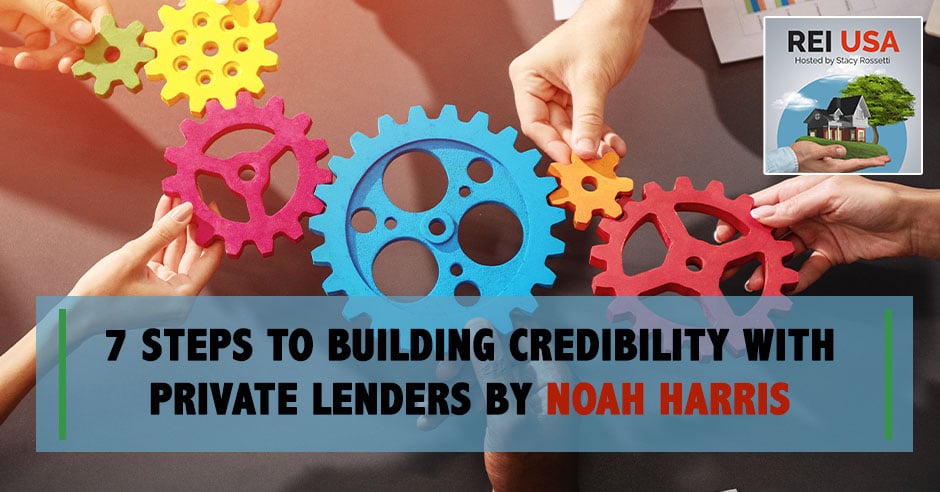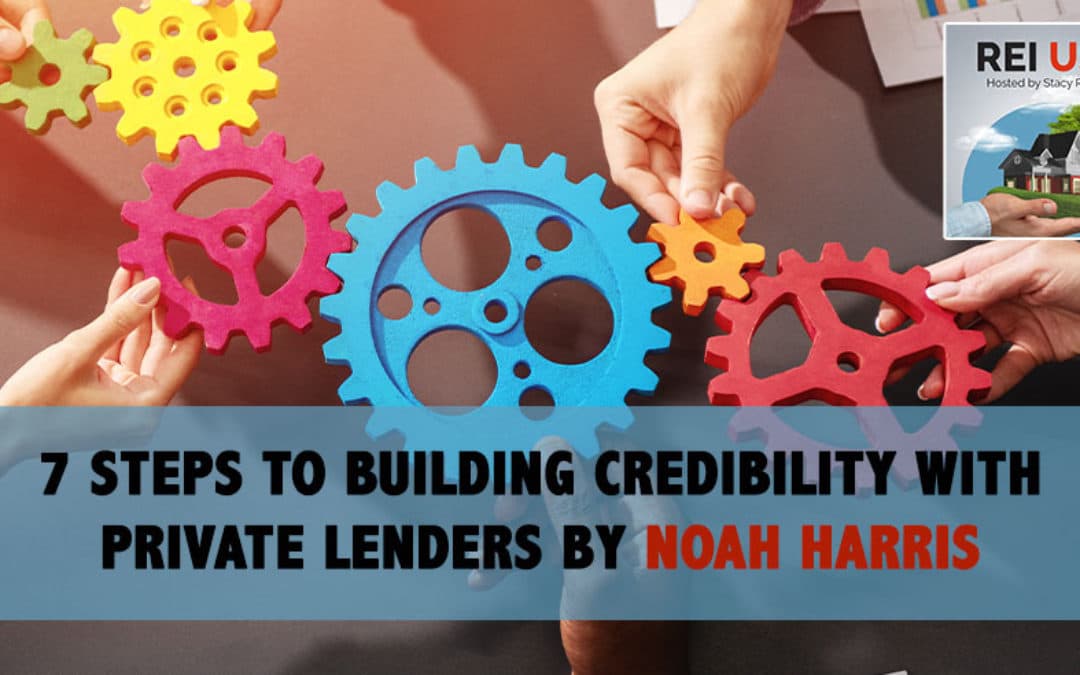
Nowadays, movies with heroes with superpowers are admired by people. At the same time, we admire real estate experts and their superpower of being the best borrower they can be and how they are helping private lenders. But what is the most important factor considered? Credibility! Listen to this episode with Noah Harris as he shares the steps to establish credibility, especially with private lenders.
—
Watch the episode here
Listen to the podcast here
7 Steps To Building Credibility With Private Lenders By Noah Harris
I’m excited to teach this topic. To me, this skillset of being able to raise private money is a superpower. Captain America has his shield. Ironman has his outfit. Superman can jump, fly, and do all that stuff. Wonder Woman has her lasso of truth. To us, as real estate investors, the ability to raise private money is a superpower. Here’s the deal, with great power comes great what? Responsibility. Raising private money is easy. It’s simple. If you spend time with Christy and I in our training with REI-USA, there’s no doubt in my mind this is going to be simple.
This might be your favorite part of the business when we’re through with you. Following through with the rehab is going to be a big part of how good you’re going to be at borrowing money. A lot of people think that a superpower is being able to borrow the funds. The goal is to be able to pick up the phone, make a phone call and secure funding. The goal is to be able to look a seller in the eye at their house and shake their hand on the agreed-upon price with 100% confidence. You know exactly where you’re getting the funding from. The real superpower with private money lending is being a great borrower and the best borrower that you can be.
Helping lenders by paying lenders a great rate of return on their money that they’re simply not going to get anywhere else. We can’t walk into a bank and say, “Do you have a product you could offer me? I’ve got some money. I want to put it to work. I’d like to secure it with an asset of $0.70 on a dollar and make a double-digit rate of return. Have you got anything like that back there?” They’re going to look at you like you’ve got eight heads. They’re going to be like, “No, that’s what we do.” This is an awesome superpower, but our superpower is not getting the money. It’s being a great borrower and helping people, helping lenders make great rates of return on your money. I can’t stress that enough.
Anytime I teach a class with REI-USA, live, in-person, or wherever, cover two slides and these are important. This is going to help your credibility. This is all about establishing credibility. Don’t skim over this stuff. This is important. If I were to ask you, “Did you want to see real-life examples of private lenders and deals that we’ve gotten funded or deals that we’ve gone on or meet-ups?” you’re probably going to say, “Show me the real-life stuff. I’d like to see exactly what happened.” “That’s what I’m going to do,” but real estate is unique. That’s what’s cool about it. There’s no single piece of real estate that’s the same. There’s no deal that’s the same. Nothing ever goes the same.
Every single day, I see something different in this business. Just because I share a success story of myself or a lender, know that that is never going to happen to you the exact way that it happened to me. A big part of me started teaching this because I had some friends that got hurt lending money to people who didn’t know what they were doing. In fact, they didn’t know what they were doing. They’re like, “I’ve got a problem. I think I’m good.” They didn’t have the right documents. There’s a lot of stuff that could go wrong. Let’s take this seriously. People can make money. They can lose money. You guys are smart. You understand that, but we shouldn’t avoid talking about it because your lenders are going to want to know.
Disclaimers as far as licensing, and this is important. I’m not an attorney. You’ve heard other people on this call say that. I’m not a real estate agent. I’m not an accountant. If you talk tax strategy or something like that, I’m sharing from the perspective of an investor. I’m not licensed in anything. Some people would say, “I shouldn’t even have a driver’s license.” My wife being one of them. Here’s the deal. Here’s why I’m saying. I know what you’re thinking. I get it. Get to the meat and potatoes. We want to learn the seven steps to credibility. This is the meat and potatoes. This is the meat and potatoes. This is the nuts and the bolts.
[bctt tweet=”Every single day, you see something different in this business.” via=”no”]
Surround Yourself With Business Professionals
Credibility tip number one, write it down. Surround yourself with business professionals. I can’t stress this enough. This is huge. If you’re a brand new real estate investor, and you’re talking to someone. You’re like, “This person might be interested in funding one of my deals.” They ask you, “How many deals have you done?” You’re like, “This is my first one.” Who’s going to want to lend on your first one? Nobody. Here’s what I would say, find the best of the best in your market. Imagine many years ago, I was baby-faced and my mindset was, “Who’s going to lend to me. I’m just a kid getting started. It was silly.”
One of the things I decided to do, made a decision is, “I’m going to surround myself with the best of the best. I’m not the sharpest grant in the box,” or whatever the saying is, but what I am good at is surrounding myself with the best of the best. This is a huge step one. Get a real estate attorney because who is going to be drawing your documents up, the prom note, the mortgage, and who’s doing your closings? This is important, or title company. Who’s your contractor? How long has your contractor been in business? Do you even have a contractor picked out before you start talking about raising capital?
Who’s your real estate agent? Who’s your financial advisor? Who’s your accountant? Who’s doing your books? Here’s what’s powerful. We’re talking about establishing credibility here. Even if you were brand new, you could say, “This is my first go around, but my real estate attorney has been doing this for 25 years. My contractor is the best of the best. He’s been doing this for 25 years. He’s got an amazing team. My real estate agent is in the top 1% of our market for sales. I’ve got an accountant who handles everything and books. I’ve got decades of experience surrounding me.”
Learn And Educate
It’s a different way to break the ice. Even if you’re like, “I’ve done 10 or 20 deals,” in my mind, you’re still brand new. Don’t be intimidated with like, “I’ve got to get my first deal done.” There’s so much to learn. Surround yourself with the people that have been doing this for a long time. I would add coaching and mentoring to that too. That’s why you’re here with Stacy. That’s number one, credibility. I hope this is good stuff. Number two, learn then educate. Most of our private money lenders have never been private money lenders before. Sometimes, when coaching or teaching, someone will say, “Where are all the private money lenders?” There’s no store.
It’s not like, “You go down to the street to Main Street and then turn left. That’s the private money store.” It’s everywhere. Most of the time, with our lenders, what we’re doing is we’re teaching people about the options that they have and educating them. What happens is that 9 times out of 10, they end up wanting to be lent. If someone came to me and said, “I want to get into real estate. I want to own a rental property. I’m thinking about doing a flip,” I’ll ask them, “What’s your goal with all of this?” We all know someone that’s like, “I’m thinking about buying a rental. What should we do?” Nine times out of ten, it’s just cashflow or they want to make money with their money.
If we can show them, “What if instead of buying this rental property, just lend me the money and we go through our system, which I’m going to share with you.” We teach people their options. A lot of my lenders probably never would have thought that they could be a lender or would become a lender. If I hadn’t shared with them, “If you look at the list there on the left, like seller finance.” Christy did seller finance. It’s another way of saying private money lender because that person’s getting a mortgage, a problem and all the same stuff. When I’m meeting with a seller, I’ll say, “Congratulations on selling me your house. You’re going to make $200,000. What are you going to do with all this money? You’re going to take a trip and you want to cruise? What are you doing?”

Private Lenders: The real superpower with private money lending is being the best borrower that you can be.
Have a good laugh, and they were like, “I don’t know. I’ll probably just stick it in the bank. I’m not sure about the stock market.” “How would you like to make a 6%, 7% or 8% rate of return on your money for the next six months while I renovate this house because I was planning on bringing in a lender. Why don’t I just pay you?” There are ways that we can do this. Hop on our REI-USA calls once a month. Putting cash out of life insurance policies and working in two different places using IRAs. There’s so much that people could use. 9 times out of 10, they don’t know.
Mindset Is Everything
If we teach them, and we’re the ones that they’ve learned, this stuff from our credibility starts to go up. Tip number three, mindset is everything. If you’re on your hands and knees, and you’re like, “Please, I need this money.” I see this on Facebook all the time. Bonkers drives me insane because what happens is people like, “I need a deal. I need cash. I’ve got this deal.” They make it about me. They turn like me, monsters. They sound so desperate for cash. Anytime we’re raising capital, this is an opportunity for another person to make a great rate of return on their money and have that loan secured by an asset.
You can’t walk into a bank and get this stuff. Know that we’re creating win-win situations. We’re introducing them to opportunities that they just never would have known existed. Having that mindset of like, “I’m the one who’s presenting you. I’m the one that’s in control. I have positioning here because I have something that you’re not getting anywhere else.” If someone were to go to the bank, you guys know the numbers, and I would have this chart somewhere on your website. Maybe you hand it to them or you have it in a flyer or something. If you’re meeting with someone, showing them the differences and this is money that’s compounding. If someone were to put the money in the bank at 1%, let’s say it’s $100,000, it’s going to take 72 years for them to double their money.
If we have the ability to help a person make a 12% rate of return compounded annually, they’re going to be able to double their money in six years. You can see the chart, the numbers, and it’s staggering. Here’s the power. Remember, what’s a superpower? It’s being a great borrower and helping lenders make great rates of return on their money. The difference between a lot of my lenders, and people that I’ve helped from going from 1% to 12%, what’s the difference between the person who makes 1% of the person that makes 12%? It’s us explaining this to them and showing them this opportunity to have that mindset that we’re helping people big time.
Here are some common terms that Christy and I use. This is simple interest annualized. Basically, if I’m paying someone 12%, if I have their funds for the entire year, they’re making that 12% rate of return. If I have their funds in a project for 6 months, then they’re making 6%. In order to get the full 12%, it’s got to go the whole year. For shorter loans, sometimes we’ll add what’s called points. You brought might be familiar with that where it’s 1% or 2% points of the loan. What Christy and I do is we always set up our flips on twelve-month balloon loans. Even if we’re thinking the project’s going to take 4, 5 or 6 months, we set up on a 12-month balloon loan and give ourselves lots of options.
In my mind, sometimes lenders are, we think if you’re new, lots of times you think that the person wants to give us their money and get it right back. That twelve months seems like a long time. If you’re new, you might be thinking that. If you’ve been doing the business for a while, what you’ll find out is not a lot of people like that. Think about this. If someone’s selling stocks or liquidating something, there’s a process to it, they probably put in some work, paid some fees or taxes, and now they’re investing with us, they want their money to go to work. They don’t want it back. If we say, “These flips are only going to take three months,” they’re going to be like, “I’m not gonna make as much interest as I want.”
[bctt tweet=”Surround yourself with business professionals.” via=”no”]
Follow The Rules
Don’t be afraid to go long. Sometimes if you work with a lot of hard money companies, they might say, “It’s 6 or 9 months, but you can extend.” They’re hoping that you screw up and you have to extend because the fees are pretty high to do that. We always give ourselves a cushion and our lenders like it. We can do monthly interest payments or everything paid at the end. There are four critical documents that we use every single time. Credibility tip number four, follow the rules. We never advertise. I never advertise. We offer a guaranteed rate of return, and we’re not pooling funds. A few sessions ago, someone asked Stacy, “What’s the difference between syndication, pooling funds and doing a private loan?” It’s a debt position.
We’re giving them an instrument, which we’ll talk about on the next slide, where they have a deposition. They’re the lender. It’s not an equity position. It’s different. It’s important that we know this and we’re able to explain this to someone because lots of times, I’ll meet people and they’re like, “We’re all going to pool our money together. Let’s keep it nice and clean. Follow the rules. Everybody’s going to get a loan or a mortgage. No problem.” If we do more than one lender on the same deal, that’s how we do it.
Promissory Note
Credibility tip number five. This is huge. This is why I got into helping people and teaching this stuff is because I had some friends that were lending money and they weren’t doing any of this stuff, or they were doing 1 out of 4, and they ended up getting hurt, missing out, losing some money, calling us, and we try to help them. Here’s the deal. If you’re a lender, you’re going to ask for this every single time.
If you’re a borrower, you’re going to provide this every single time. Number one, we’re going to do a promissory note. This outlines the terms of the loan, “We’re going to provide you with a mortgage or deed of trust. This is going to act as your security on the property, Mr. or Mrs. Lender. We’re going to list you on the insurance as the loss pay.” I always do personal guarantees as well. That’s usually thrown into the promissory note.
One time I was like, “Why would you do a personal guarantee?” “Because I believe in my deal. If you’re not willing to do a personal guarantee, what does that say about your deal?” I don’t know. That’s how I do business. Write down, “Every single time, don’t lend money without this stuff because 9 times out of 10, figuratively speaking, something’s going to go wrong.
Know Your Business Model
Credibility number six, know your business model. Let’s say you got someone who’s interested in this. You got like a bite. Fish is on the line a little bit. Feed them some more. They might want to know more information. This sounds good. Double-digit rate of return. Tell me a little bit more. Here’s what I recommend. If you’re fixing and flipping, like let’s use this as an example, know your numbers and your neighborhood well.

Private Lenders: Surround yourself with the best of the best.
People always ask me like, “Where do you recommend I start? Which neighborhood do you recommend I start and always?” Pick one that’s close to you. Pick a neighborhood that’s on the other side of town. Pick your neighborhood. Who cares? Have numbers in place of what your typical purchase price is going to be, what you expect repair costs to be, and the total of those two.
When I borrow money, I borrow all the money that I need to buy it and fix it up, and have the number of what it’s going to be worth, once it’s all renovated, fixed up and you go to the list on the market. For a long time, this was our little sweet spot. We still do these numbers here in Columbia, South Carolina. They’re creeping up a little bit.
Right around here, this gives someone a good idea of what your business model is. If someone’s interested in lending you money, you better be able to say this, roll off the tip of your tongue. I’ve said it 10,000 times, at least, “Mr. or Mrs. Lender, what we do is we buy houses for $100,000. We put $50,000 into them and a person’s $150,000 loan is secured by a $225,000 asset.” It’s like a banquet one. If I were to give you a homework assignment, I would say, “Pick your neighborhood. Figure out what your goal is. Maybe you work backward with Mayo.”
Our sessions at REI-USA. I got a great detail about how to come up with these numbers. After repair value, let’s say it’s $225,000, I know that I times that by 70%, subtract my repairs and this is what I’m looking, “Mr. and Mrs. Lender, we buy for a $100,00, put $50,000 into it. The person’s $150,000 loan and secured by a $225,000 asset like a bank.” These are the things that people are going to want to know.
This is something super cool, which I’m going to share with you in the elevator pitch. The value in this is because there’s no private money store, but I’m having these conversations in my kids’ hockey games. I don’t get out of the house much. If we are at the restaurant right at the bar Christy and I get a night out. These are the conversations that we’re having.
Here’s an example. This is our business model. These are our numbers. When we go to borrow money, we’re in line with what we’re saying, “Mr. and Mrs. Lenders, what we’re doing with this project is buying it for $95,000 or putting $35,000 into it. Your $130,000 loan is secured by $207,000 asset. Like a bank, we would want it secure.” I’ll show you the examples. I see all the time people share, “It flipped this house and made $30,000. Look at me. I’m cool.” What if you’d notice, and you follow Christy on Facebook, we don’t do any of that. What we do is we make our lenders look cool.
[bctt tweet=”What’s a superpower? It’s being a great borrower and helping lenders make great rates of return on their money. ” via=”no”]
We put our lenders on a pedestal. We say, “Congratulations to our lender. In 153 days, they made $6,537.69. They got a total payoff of that number there. They are super stoked. We look forward to another one,” and then zip it. We don’t even ask people for money because they’re going to be like, “That looks awesome. How do I get in on this? I want to do the next one. What’s the maximum amount that you’ll take?” It naturally happens. Putting your lenders on the pedestal is the superpower.
Being a great borrower helps lenders make great returns on their money, and we create win-win situations by doing so right, “Here’s another one. This is the same person. They finished this one and went right over into this one, made almost $2,700 in 103 days.” It’s not a lot of money on $95,000. She’s making a great rate of return.
Practice Your Elevator Pitch
Here’s credibility tip number seven, practice your elevator pitch. When I say elevator pitch, there are stages to it. When you meet someone, you’re not going to say, “We give you a promissory note. We give you a mortgage. We give you this much percent. Here’s my business model.” You might run into this person 3 or 4 times over the next month. Each time you run into them, maybe you’re doing the next step.
If I’m at a hockey game and then I got a parent that’s there, I always ask them, “What do you do for a living?” I’m truly sincerely fascinated by how other people make money and how they’ve spent the last many years with their careers. It’s cool. I flip houses. I’m not impressed with that. If you’re a firefighter, a police officer, if you’re a teacher, IT, or whatever it is, I’m like, “Thats’ cool. I don’t think I could have done that. I’m fascinated.”
What happens with human nature if we ask someone what they do for a living? What are they going to ask us? They’re going to ask us, “What do you do?” That’s what I’m looking for. Let’s open the door and have this conversation instead of saying, “I’m a wholesale. I rehab. I would do this. Airbnb.” I keep it very vague. What I found is I say something like this and maybe you can too, “Have you ever seen house-flipping shows?” Who hasn’t seen a house-flipping show? 9 times out of 10, they’re fascinated by that in some facet. Let’s say, “I’ve always wanted to do that. I’ve always been curious about that.”
I like to hear what intrigues them about the house flipping shows, and then we talk a little bit about that. When they say, “I’ve always wanted to do that,” I always say, “Tell me why you have it yet. What’s been stopping?” It’s simple. It’s knowledge of how to do it. It’s their time. Some people think you need a lot of money. You need to be a millionaire to do this, which we all know isn’t that accurate. I find out what has been stopping them.

Private Lenders: Anytime we’re raising capital, this is an opportunity for another person to make a great rate of return on their money and have that investment, that loan secured by an asset.
Let’s say someone, for instance, always wanted to do it by just never knew how. I don’t know if you’d be interested in something like this, but my wife and I do this full-time and we have people who private money lend on our transactions and make a great rate of return. They get an inside look at how we do things while they’re making a great return on their money. Would that’d be something that you’d be interested in?
Let’s follow it up with a meeting and go it to greater detail. I don’t want to talk about the hockey game. It’s weird. You do a little takeaway and let them go home thinking about that opportunity and the next week that you see them, “Let’s set up at the meeting. “Okay.” Money’s everywhere, and a person doesn’t have to be a millionaire to be a private money lender. Many of our lenders start off at $30,000, $40,000, $50,000, and then they just put it back in. We figure out ways to work with people who aren’t serious, which is cool.
Here’s the elevator pitch. I would take a picture of these screenshot notes. I would say this 10,000 times until you say it in your sleep. The first part is this, “What do you do for a living?” I’m a doctor. That’s super cool. You must be really smart. I can never do what you do.” “How about you? What are you doing? Have you ever seen a TV show flip this house? I’ve always been fascinated by that.” “Which part has been fascinating to you.” I’ll tell you a little bit about what we do. We buy houses for $100,000. We’ll put $50,000 into them.
A person’s $150,000 loan is secured by a $225,000 asset like a bank would want. I would leave it at that and then let them marinate and be like, “That’s cool.” A lot of people don’t know this, but we treat our lenders like a bank. We give them a mortgage, a promissory note and we list them on the insurance as the loss pay, just like a bank would want. You’ve probably done this before when you bought your house. You signed all those documents for the bank. In this type of scenario, you would be the bank.
What kind of returns are we talking about here? We pay our lenders a great rate of return secured by a hard asset, $0.70 on the dollar. People love it. You can throw out percentages and things like that, like 8%, 10%, 12%. I don’t really like to. Sometimes, double-digit. What I found is we don’t want to overpay. If I set up a meeting, because the elevator pitch is top of the four documents, rates of return, I’m going to say, “How’s your money working for you now? I feel it’s just sitting in a savings account. Why am I going to go and give them 12%? They’d be ecstatic to be making an 8% to 10% rate of return on their money.
These are some tips, your seven steps. Christy was like, “What if I finish early on my session?” I’m like, “You can talk about this for three days. What are you worried about?” She’s laughing. I’m like, “Keep going. What’s cool is we can catch up on our monthly session.” Hop on it. If you haven’t already, join us. I highly recommend it. There are seven steps I could spend an hour or two on each one of those. That’s what we’re going to be doing with our sessions moving forward.
Important Links
About Noah Harris
 Noah Harris is a real estate investor from South Carolina. Christy is heavily sought after for her knowledge on rehabbing, passive income properties, and mobile homes. She’s an award winning coach with a love for helping others. Being a business owner, married, and a mother of two, she’s done anything but slow down. This supermom has mastered what it takes to balance the chaos of family life and real estate investing.
Noah Harris is a real estate investor from South Carolina. Christy is heavily sought after for her knowledge on rehabbing, passive income properties, and mobile homes. She’s an award winning coach with a love for helping others. Being a business owner, married, and a mother of two, she’s done anything but slow down. This supermom has mastered what it takes to balance the chaos of family life and real estate investing.
Noah is a real estate investor from Columbia, SC. Noah Studied Finance and Real Estate at the University of Central Florida. He is a full-time real estate investor who for the past 15 years has worked with some of the brightest real estate minds in the Country. Noah’s favorite aspect of real estate investing is private money lending, raising capital, and teaching others how to do the same.

